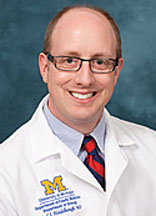
In a moderated lecture at the annual joint American Urological Association and American Society for Men’s Health meeting, Joel J. Heidelbaugh, M.D., professor, presented the new prostate cancer screening guidelines including the latest draft statement from the U.S. Preventative Services Task Force.
The new statement is controversial as it recommends that clinicians inform men ages 55 to 69 years about the potential benefits and harms of prostate-specific antigen (PSA)–based screening for prostate cancer and make decision about screening on a case by case basis. This is a change from the 2012 guidelines which recommended against (PSA)-based screening for prostrate cancer.
“It's both important and welcoming to present the primary care perspective of prostate cancer screening at the most highly visible urology meeting in the US. This venue provides the optimal forum for discussion and collaboration between primary and specialty care on improving parameters for this controversial screening test," Dr. Heidelbaugh commented.
Dr. Heidelbaugh, the president-elect of the American Society for Men’s Health, can provide the unique viewpoint of the primary care perspective of these guidelines to a group of both urologists and primary care providers.
“It is noteworthy that Dr. Heidelbaugh have the opportunity to present to both primary care physicians and specialists. The use of PSA testing has been very controversial. Family physicians have a different perspective than urologists. Their focus tends to be on populations, which is an important perspective in this specific case,” noted Philip Zazove, M.D., the George A. Dean, M,D., Chair of Family Medicine. “Guidelines made for populations are best based on population data and interpreted by those with expertise in populations. Thus, I would argue that family physicians are better suited for that situation. Guidelines made for patients with cancer who need treatment are best made by people who care for them such as urologists and oncologists.”


